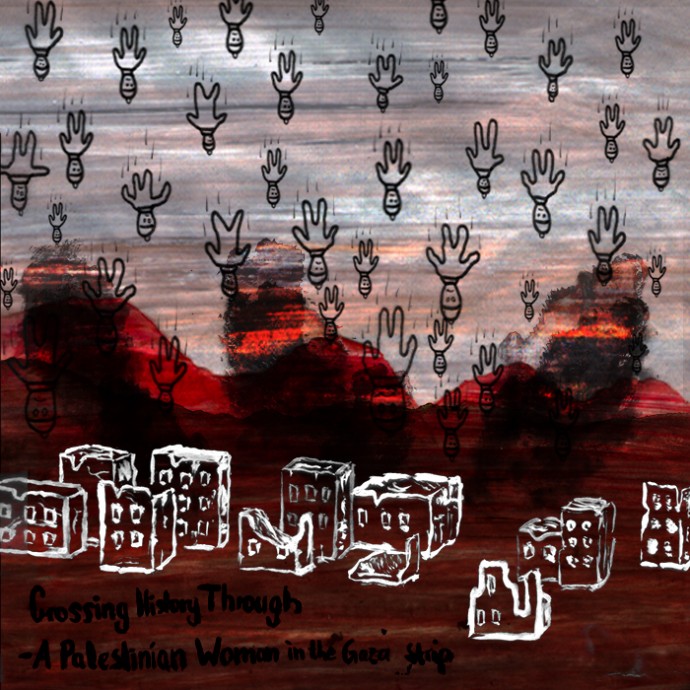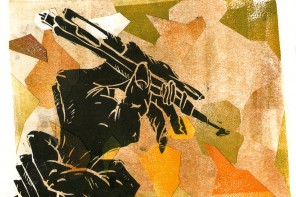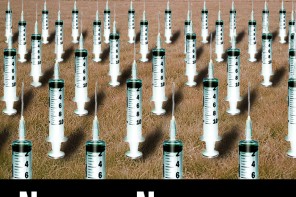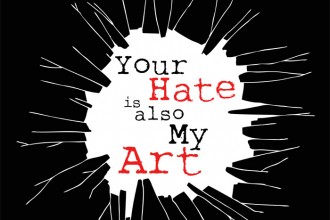On the 27th of December, 2008, a conflict between Israel and Palestine began and ended after three weeks and a day. Israel stated its goal was an attempt “to stop rocket fire and weapon smuggling.” As a result of the conflict, more than one thousand Palestinians died, almost half of them non-involved civilians, along with ten Israeli soldiers. In 2012, according to the Israeli government, Hamas began firing rockets on Israel once more, and the conflict started again. More than one hundred Palestinians died, and one thousand of them were injured. On the other side, four Israeli civilians died and almost three hundred were injured.
From 8th of July, 2014, onwards, Israel has started a new attack on the Gaza Strip, because of similar reasons. Almost two thousand people have died so far—many of them are children.
In spite of the war, some people are trying to give information to the outside world, using social media such as Twitter or blogs, and one of these people is Najlaa Ata Ataallh. Najlaa is a female writer, aged 26, living in Gaza. She witnesses violence around her every day, and has tried to cope with the situation by writing down her feelings since she was 14 years old. She shares how the war has affected her life.
Before the attacks started on the 7th of July, my fiance and I were planning to get married and set up our new family. We had dreams of having children and raising them in a secure and safe place. Unfortunately, because of the war, we had to cancel our wedding and postpone these future dreams. For sure, this war has made me think twice about having children in Gaza, a city which has been under attack every two years since 2008.
Living in a city that has been under siege for the past eight years is the most tragic thing that can happen in your life. I have been through three wars in less than six years, every time facing the reality of death and loss. In each of them, I experienced the sadness and the fear of losing loved people in my life. This is a very hard situation to talk about. I don’t even know if I will still be alive after this interview or not. Every creature in Gaza is treated as the next target of Israeli warplanes. We are living in horror and anxiety. There is no safe place in the Gaza Strip. When they bombed the houses nearby in our neighborhood, we felt as though we’d died, and already crossed the gates of heaven.
I confine myself inside when the bombings start, and wait for them to finish day after day. Yet the situation is getting worse and worse. We are living without electricity. Only the personal generators can provide electricity, and soon we will run out of water and fuel. I can’t deny that most of the time, when we are under bombing and shelling attacks, I wish I could leave this country and live somewhere else. But I still believe that I was born here for a reason, and everything I know is in Gaza.
It can be hard to imagine what the war scene looks like, but what you can’t even come close to understanding is how a person feels after they have watched an Israeli warplane destroy a house which took sixty years of hard effort to build. Seeing the body parts of children lying in the streets makes you believe the only thing you can do is beg God that he may protect the rest of them.
War makes you more able to value your life. After each war, knowing you are still alive enables you to switch your path. It is not a matter of working a miracle, but it is a matter of resistance and continuing your life as any other person does, with a beating heart.
When I was fourteen years old, I started to write, and Gaza is in all my writings. I decided to write a blog after the fourth day of the attack in July, when I began to record my feelings day after day about the war outside, and a friend of mine helped me to translate them to English. For me, writing feeds emotions. Writing helps me to struggle with fear and resist it. After every piece that I write, I know that some things will be changed inside me—I think writing leads you to care about details, and think wisely about everything that happens around you.
I use writing to get out of the war, but it’s not easy to put the words down, surrounded by the sound of bombing. When we turn on the generator, I try to earn minutes of life, a life outside the conflict, and begin to write. I think of my situation and transform it into words. It is the most valuable thing I can do, because literature is a channel: a way to cross history with words. I don’t know what I will be doing after this war, but I am sure about one thing: I am going to continue writing, whatever happens.







